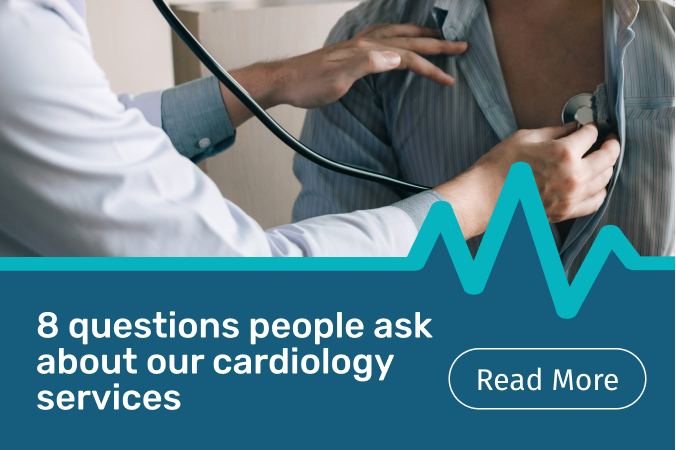
Cardiology Service
At Prince of Wales Private Hospital, we are renowned for our cardiac care. A comprehensive range of diagnostic and interventional cardiac services are available through our partnership with Eastern Heart Clinic, which is a co-located independent service owned and managed by many of our consultant cardiologists. We have an expert team of 17 cardiologists and four cardiothoracic surgeons who have minimal wait times for their patients.
As well as world class specialists and doctors, we have state-of-the-art equipment and technology, which enable us to perform a range of cardiac procedures in the catheter lab and our hybrid theatre. All cardiac procedures are supported by our coronary and intensive care units. We are proud to be the heart of cardiac health care in Sydney.
The private experience
Expect better when you’re with us. Your private patient comfort includes:
- Specialist of your choice
- Accommodation mainly in single rooms with ensuite
- Private dining menu
Next steps
If your GP has recommended more complex cardiac care, ask for a referral to one of the state’s leading specialists. Tell them that you prefer to be treated at Prince of Wales Private Hospital, the heart of cardiac care.
Our world class cardiologists and cardiothoracic surgeons treat a range of heart conditions and related symptoms.
If you are experiencing any of the symptoms listed below:
- Chest pain/Angina
- Palpitations – racing or irregular heartbeat
- Shortness of Breath
- Dizziness or fainting
- Signs of heart failure – swollen ankles, unable to lie flat or waking short of breath
You should contact your GP or present to our emergency department for assessment. If you require urgent attention dial 000 (triple zero) and ask for an Ambulance.
Heart disease remains the main cause of death in Australia. Prince of Wales Private Hospital is a leading cardiac hospital, where the most sought after cardiac providers fight this statistic by dedicating themselves to the best possible care.
It's safe to say that you, the patient, are at the heart of everything we do.
Cardiothoracic Surgery
Prince of Wales Private Hospital is a leading centre for cardiothoracic surgery. We are able to cater for all surgeries, from open-heart to minimally-invasive techniques such as hybrid and robotic-assisted.
Our highly-experienced Cardiothoracic Surgeons all hold appointments in public hospitals and, therefore, are exposed to the very latest in heart and lung treatments. At Prince of Wales Private Hospital, they perform a variety of procedures, including:
- Coronary Artery Bypass Surgery (CAB) – Healthy blood vessels are grafted onto the heart to compensate for blocked arteries.
- Heart Valve Surgery – A repair or replacement of any of the heart’s four valves.
- Lobectomy and Pneumonectomy – A partial or total lung removal.
- Major aortic surgery for aneurysms.
- Pleurodesis – Treatment for trapped fluid or air between the lungs and the chest cavity.
- Thymectomy – Removal of the Thymus.
The Hospital has state-of-the-art hybrid and cardiothoracic theatres, and a dedicated robotics theatre, in which procedures can be performed using the da Vinci XI® Surgical System. With minimally-invasive procedures like robotics, patients usually have a faster recovery and fewer post-surgical complications than they would after a traditional open surgery.
Patients who undergo cardiothoracic surgery require acute, specialised post-operative care. Our Hospital has a Cardiac Care ward, as well as an Intensive Care Unit for high-dependency needs.
Procedures we offer in partnership with Eastern Heart Clinic:
Coronary angiography is the process of taking images of the coronary “heart” arteries by passing a thin tube called a catheter through an arm and leg artery to the top of the heart. A small amount of contrast is injected and an x-ray camera outside the body takes images.
Coronary angioplasty and stenting are procedures to reopen blocked or significantly narrowed coronary arteries. This may involve inflating a balloon or placing a stent (an expandable metal scaffold) into the artery to restore blood flow.
Angiography and stenting are commonly performed under local anaesthetic and IV sedation without the need for a general anaesthetic.
A pacemaker is a small device usually inserted under the skin of the upper chest and attached to a pacing wire that paces your heart when your heart is unable to do so adequately. This procedure is commonly performed under local anaesthetic without the need for a general anaesthetic.
An implantable cardioverter defibrillator (ICD) looks similar to a pacemaker, though slightly larger. It works very much like a pacemaker. But the ICD can send an energy shock that resets an abnormal heartbeat back to normal. Many devices combine a pacemaker and ICD in one unit for people who need both functions.
Also we are one of very few centres that perform pacemaker lead extractions this is a specialised area as the operator needs to perform a certain number to maintain accreditation, with only 13 doctors accredited in Australia to perform lead extraction.
Lead extraction means using specific tools to remove redundant (no longer needed) or infected pacemaker or defibrillator leads from a patient's heart.
Coronary bypass surgery, otherwise known as coronary artery bypass graft (CABG) surgery is a procedure that uses another artery or vein to restore blood flow to your heart muscle by bypassing the area of blockage or narrowing.
For severely narrowed or leaking valves these may be repaired or replaced. This can be achieved with standard surgery, less invasive surgery or via minimally invasive catheter-based procedures. To replace a heart valve, your doctor may remove the heart valve and replace it with a mechanical valve or a biological tissue valve.
Structural heart procedures provided by Prince of Wales Private Hospital include:
- Patent foramen ovale closure (PFO)
- Atrial septal defect (ASD)
- Ventricular Septal Defect closure (VSD closure)
- Left Atrial Appendage Occlusion or Closure
CTCA uses computed tomography (CT) scanning to take detailed images of the heart. It is a quick (scanning takes 15 seconds) and easy test, without the need for invasive procedures, to determine if there are any significant narrowing in the heart arteries.
Electrophysiology (EP) studies, are a series of tests that examine your heart's electrical activity. They involve mapping the electrical paths in the heart to determine if significant electrical abnormalities exist. This may be carried out prior to considering the best management for heart arrhythmias.
Cardiac ablation uses heat (radiofrequency) energy to create tiny scars in your heart to block abnormal electrical signals that cause rhythm disturbances. This procedure is used to correct heart rhythm problems such as atrial fibrillation.
DC cardioversion (DCCV) is used to treat irregular heart rhythms - commonly atrial fibrillation. The procedure involves a general anaesthetic and placement of electrodes on the chest. An electrical impulse or shock is delivered to return the heart rhythm to normal.
A transesophageal echocardiogram is a type of echocardiogram (heart ultrasound) that takes images from behind the heart. This is achieved by passing the probe down the back of the throat (very similar to an endoscopy or gastroscopy procedure). The images obtained are of better quality than a normal echocardiogram due to the lack of lung (air) between echo probe and heart.
An implantable loop recorder is a convenient and easy way to obtain long term ECG recording by implanting a tiny paperclip sized device under the skin. This device can record ECGs for 3 plus years and is generally suited for patients with unexplained fainting and strokes/ministrokes of unknown cause. Your doctor can remotely monitor your heart rhythm via a mobile link that you keep in your home.



